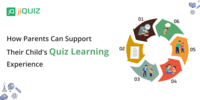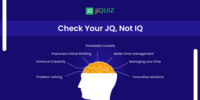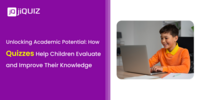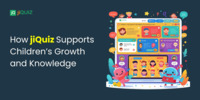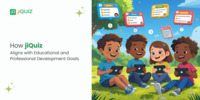- Jan 14, 2025
- Updates
- 1064
Share this post on:

In today's rapidly evolving educational landscape, traditional teaching methods are being augmented by innovative approaches that cater to the diverse needs of learners. One such approach is gamified learning, which integrates game-like elements into educational content to boost engagement and motivation. Platforms like jiQUIZ exemplify this trend by offering interactive quiz games that make learning both enjoyable and effective.
Understanding Gamified Learning
Gamified learning involves incorporating game mechanics—such as points, levels, badges, and leaderboards—into educational activities. This strategy transforms passive learning into an active, participatory experience, encouraging students to immerse themselves fully in the subject matter. The primary objective is to make learning more engaging, thereby enhancing knowledge retention and application.
Benefits of Gamified Learning
1. Enhanced Engagement and Motivation
Introducing game elements into learning materials captivates students' attention and fosters a sense of excitement. The competitive aspects, such as earning points and climbing leaderboards, motivate learners to invest more time and effort into their studies. This heightened engagement leads to improved comprehension and retention of information.
2. Personalized Learning Experiences
Gamified platforms can adapt to individual learners' needs by offering customized challenges and content. This personalization allows students to progress at their own pace, focusing on areas that require improvement, which enhances the overall learning experience.
3. Immediate Feedback and Progress Tracking
Gamified learning environments provide instant feedback, enabling learners to assess their performance in real-time. This immediate response helps students identify strengths and weaknesses, facilitating continuous improvement. Additionally, progress tracking features allow both learners and educators to monitor development over time.
4. Development of Problem-Solving Skills
Many gamified learning activities present complex problems that require critical thinking and strategic planning. By engaging in these challenges, students enhance their problem-solving abilities, which are essential skills both academically and in real-world scenarios.
5. Promotion of Collaboration and Social Interaction
Gamified platforms often include features that encourage teamwork and peer interaction. Collaborative challenges and multiplayer modes foster a sense of community, allowing learners to share knowledge and support each other's growth.
jiQUIZ: A Case Study in Gamified Learning
jiQUIZ is an educational platform that exemplifies the principles of gamified learning. It offers a diverse range of quiz categories, including General Knowledge, Science, Mathematics, and History, among others. The platform's user-friendly interface and engaging content make it an effective tool for enhancing children's learning experiences.
Key Features of jiQUIZ
Wide Variety of Questions: jiQUIZ provides an extensive selection of questions across multiple subjects, catering to different interests and educational needs.
Adaptive Difficulty Levels: The platform allows users to select difficulty levels, ensuring that learners are appropriately challenged according to their proficiency.
Time-Bound Challenges: Each question comes with a time limit, promoting quick thinking and decision-making skills.
Instant Feedback: After each quiz, learners receive immediate feedback, including scores and correct answers, facilitating self-assessment and improvement.
Progress Tracking: Users can monitor their performance over time, identifying areas of strength and opportunities for growth.
Impact on Learner Engagement
By integrating game-like elements, jiQUIZ transforms traditional learning into an interactive experience. The platform's design encourages regular participation, as learners are motivated to improve their scores and achieve higher levels. This sustained engagement contributes to better knowledge retention and a more positive attitude toward learning.
Conclusion
Gamified learning represents a significant advancement in educational methodologies, offering numerous benefits that cater to the needs of modern learners. Platforms like jiQUIZ demonstrate how integrating game mechanics into education can enhance engagement, motivation, and overall learning outcomes. As technology continues to evolve, the adoption of gamified learning tools is poised to become increasingly prevalent, shaping the future of education.

